Auditing and Assurance
VerifiedAdded on 2023/01/16
|11
|2991
|48
AI Summary
This report aims at analysing different issues in FFA in different aspects of business such as corporate governance, auditing and others. The first part considers the principles and recommendations related to ASX. The second part considers the application of AAA model to solve the ethical issue in the company. The last part addresses the issues like due care, contributory negligence and duty of care.
Contribute Materials
Your contribution can guide someone’s learning journey. Share your
documents today.
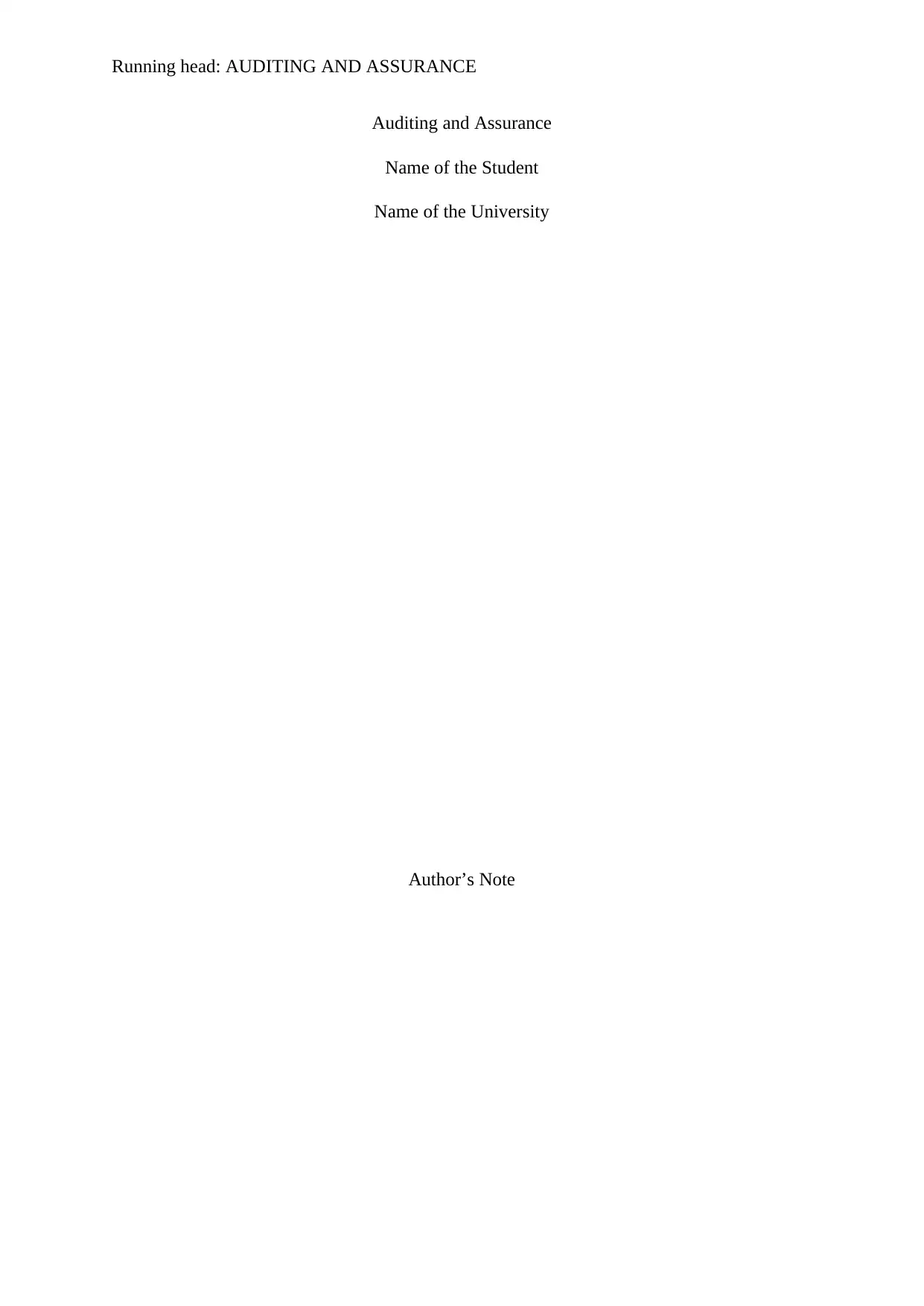
Running head: AUDITING AND ASSURANCE
Auditing and Assurance
Name of the Student
Name of the University
Author’s Note
Auditing and Assurance
Name of the Student
Name of the University
Author’s Note
Secure Best Marks with AI Grader
Need help grading? Try our AI Grader for instant feedback on your assignments.
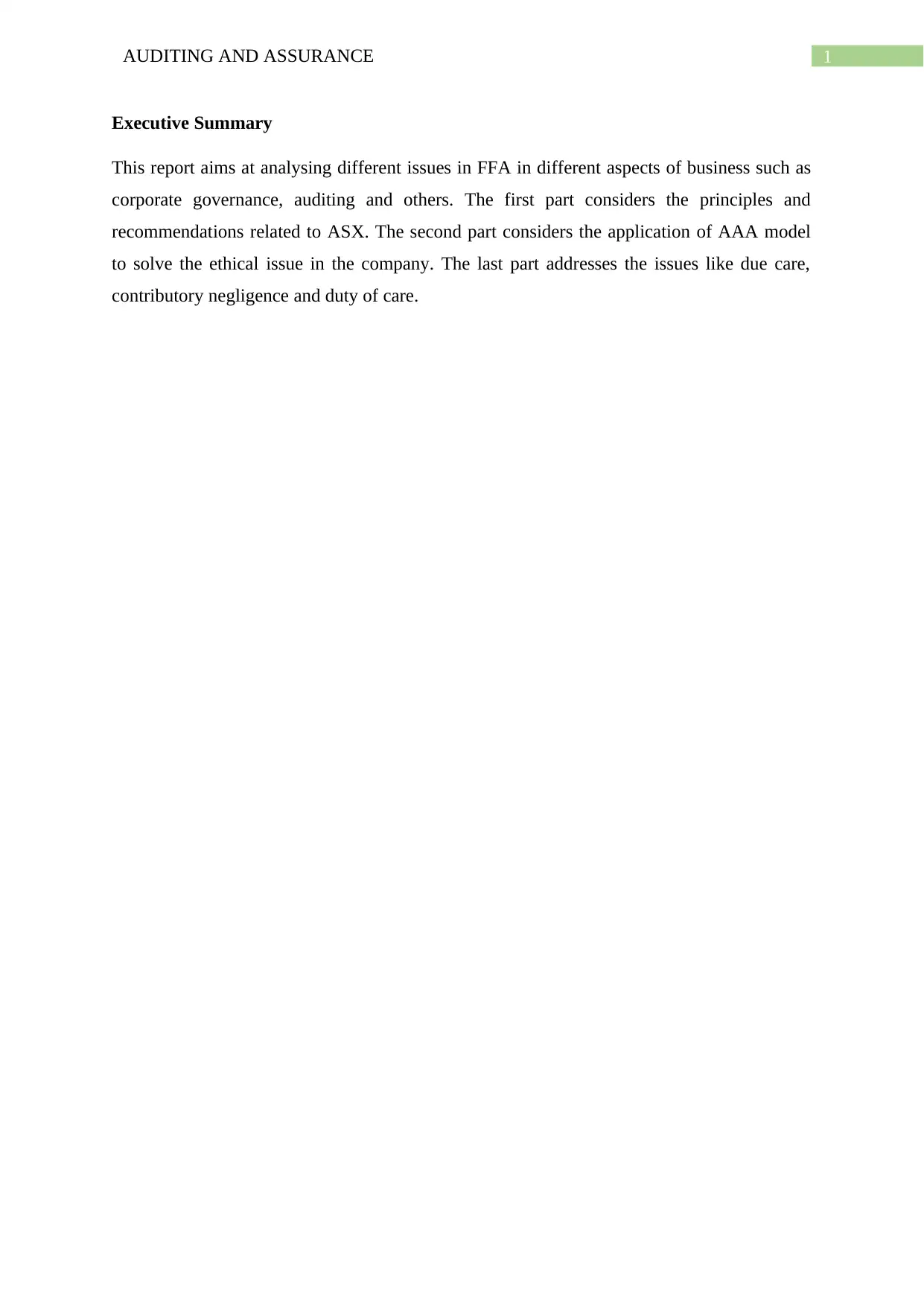
1AUDITING AND ASSURANCE
Executive Summary
This report aims at analysing different issues in FFA in different aspects of business such as
corporate governance, auditing and others. The first part considers the principles and
recommendations related to ASX. The second part considers the application of AAA model
to solve the ethical issue in the company. The last part addresses the issues like due care,
contributory negligence and duty of care.
Executive Summary
This report aims at analysing different issues in FFA in different aspects of business such as
corporate governance, auditing and others. The first part considers the principles and
recommendations related to ASX. The second part considers the application of AAA model
to solve the ethical issue in the company. The last part addresses the issues like due care,
contributory negligence and duty of care.
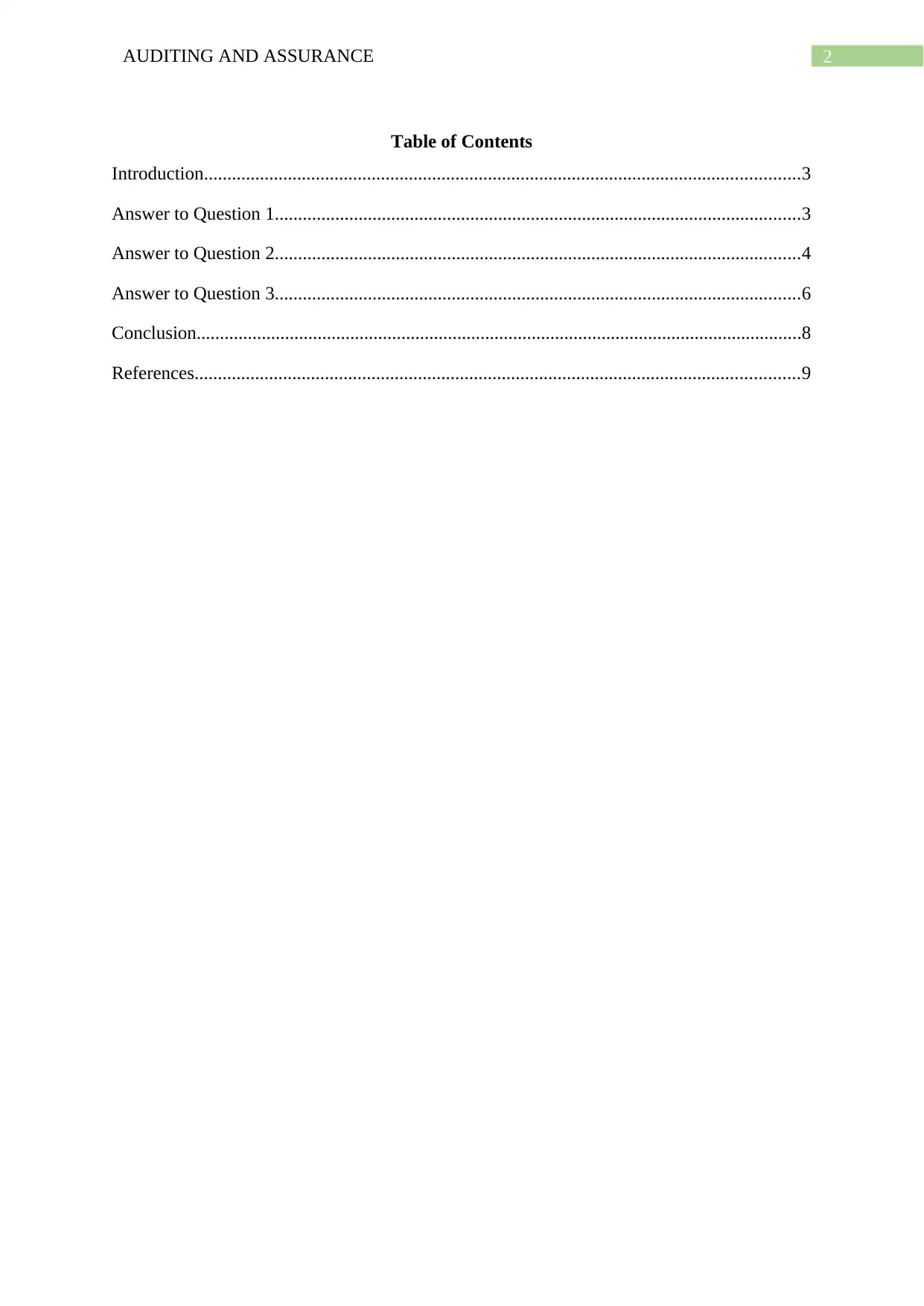
2AUDITING AND ASSURANCE
Table of Contents
Introduction................................................................................................................................3
Answer to Question 1.................................................................................................................3
Answer to Question 2.................................................................................................................4
Answer to Question 3.................................................................................................................6
Conclusion..................................................................................................................................8
References..................................................................................................................................9
Table of Contents
Introduction................................................................................................................................3
Answer to Question 1.................................................................................................................3
Answer to Question 2.................................................................................................................4
Answer to Question 3.................................................................................................................6
Conclusion..................................................................................................................................8
References..................................................................................................................................9
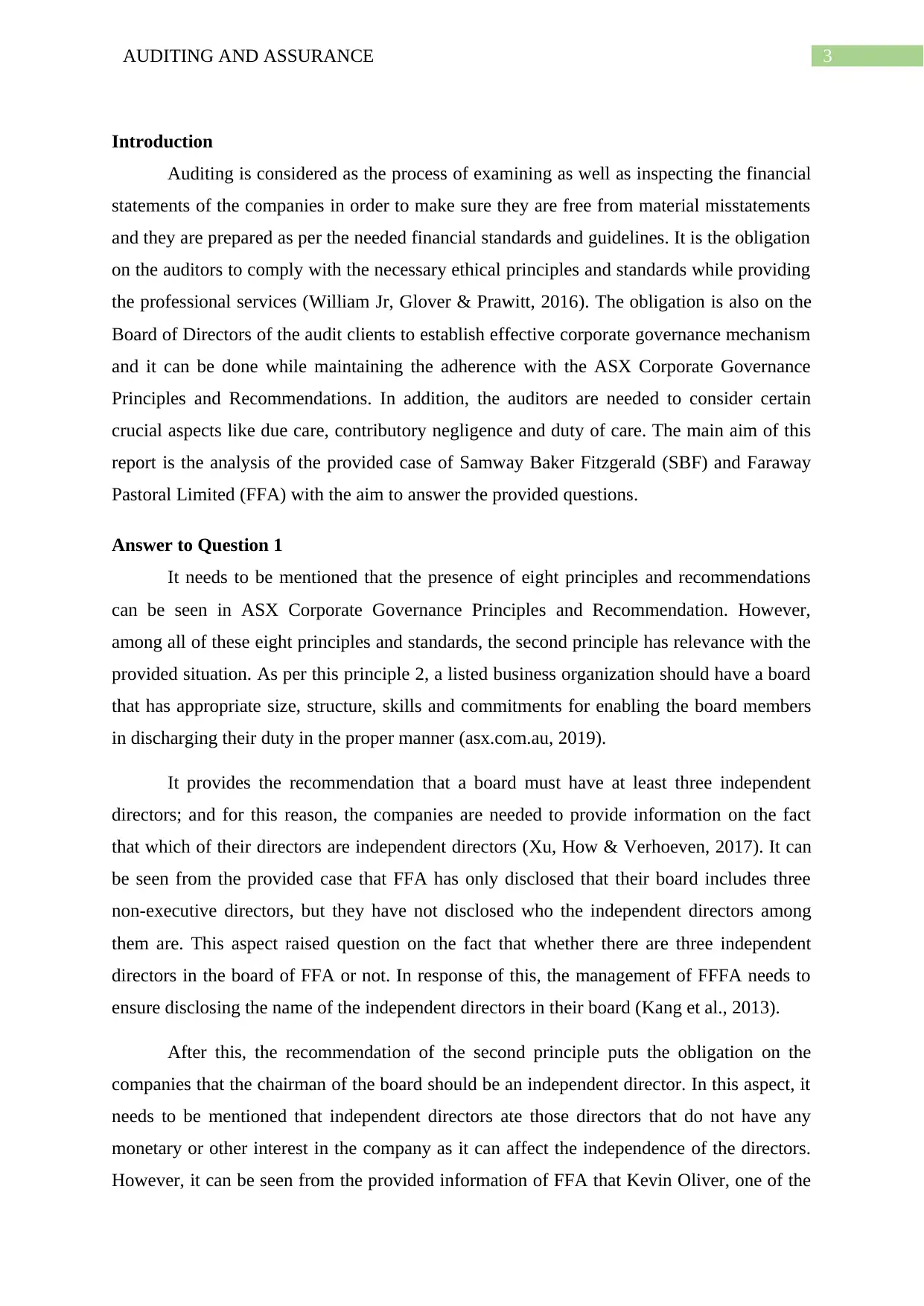
3AUDITING AND ASSURANCE
Introduction
Auditing is considered as the process of examining as well as inspecting the financial
statements of the companies in order to make sure they are free from material misstatements
and they are prepared as per the needed financial standards and guidelines. It is the obligation
on the auditors to comply with the necessary ethical principles and standards while providing
the professional services (William Jr, Glover & Prawitt, 2016). The obligation is also on the
Board of Directors of the audit clients to establish effective corporate governance mechanism
and it can be done while maintaining the adherence with the ASX Corporate Governance
Principles and Recommendations. In addition, the auditors are needed to consider certain
crucial aspects like due care, contributory negligence and duty of care. The main aim of this
report is the analysis of the provided case of Samway Baker Fitzgerald (SBF) and Faraway
Pastoral Limited (FFA) with the aim to answer the provided questions.
Answer to Question 1
It needs to be mentioned that the presence of eight principles and recommendations
can be seen in ASX Corporate Governance Principles and Recommendation. However,
among all of these eight principles and standards, the second principle has relevance with the
provided situation. As per this principle 2, a listed business organization should have a board
that has appropriate size, structure, skills and commitments for enabling the board members
in discharging their duty in the proper manner (asx.com.au, 2019).
It provides the recommendation that a board must have at least three independent
directors; and for this reason, the companies are needed to provide information on the fact
that which of their directors are independent directors (Xu, How & Verhoeven, 2017). It can
be seen from the provided case that FFA has only disclosed that their board includes three
non-executive directors, but they have not disclosed who the independent directors among
them are. This aspect raised question on the fact that whether there are three independent
directors in the board of FFA or not. In response of this, the management of FFFA needs to
ensure disclosing the name of the independent directors in their board (Kang et al., 2013).
After this, the recommendation of the second principle puts the obligation on the
companies that the chairman of the board should be an independent director. In this aspect, it
needs to be mentioned that independent directors ate those directors that do not have any
monetary or other interest in the company as it can affect the independence of the directors.
However, it can be seen from the provided information of FFA that Kevin Oliver, one of the
Introduction
Auditing is considered as the process of examining as well as inspecting the financial
statements of the companies in order to make sure they are free from material misstatements
and they are prepared as per the needed financial standards and guidelines. It is the obligation
on the auditors to comply with the necessary ethical principles and standards while providing
the professional services (William Jr, Glover & Prawitt, 2016). The obligation is also on the
Board of Directors of the audit clients to establish effective corporate governance mechanism
and it can be done while maintaining the adherence with the ASX Corporate Governance
Principles and Recommendations. In addition, the auditors are needed to consider certain
crucial aspects like due care, contributory negligence and duty of care. The main aim of this
report is the analysis of the provided case of Samway Baker Fitzgerald (SBF) and Faraway
Pastoral Limited (FFA) with the aim to answer the provided questions.
Answer to Question 1
It needs to be mentioned that the presence of eight principles and recommendations
can be seen in ASX Corporate Governance Principles and Recommendation. However,
among all of these eight principles and standards, the second principle has relevance with the
provided situation. As per this principle 2, a listed business organization should have a board
that has appropriate size, structure, skills and commitments for enabling the board members
in discharging their duty in the proper manner (asx.com.au, 2019).
It provides the recommendation that a board must have at least three independent
directors; and for this reason, the companies are needed to provide information on the fact
that which of their directors are independent directors (Xu, How & Verhoeven, 2017). It can
be seen from the provided case that FFA has only disclosed that their board includes three
non-executive directors, but they have not disclosed who the independent directors among
them are. This aspect raised question on the fact that whether there are three independent
directors in the board of FFA or not. In response of this, the management of FFFA needs to
ensure disclosing the name of the independent directors in their board (Kang et al., 2013).
After this, the recommendation of the second principle puts the obligation on the
companies that the chairman of the board should be an independent director. In this aspect, it
needs to be mentioned that independent directors ate those directors that do not have any
monetary or other interest in the company as it can affect the independence of the directors.
However, it can be seen from the provided information of FFA that Kevin Oliver, one of the
Secure Best Marks with AI Grader
Need help grading? Try our AI Grader for instant feedback on your assignments.
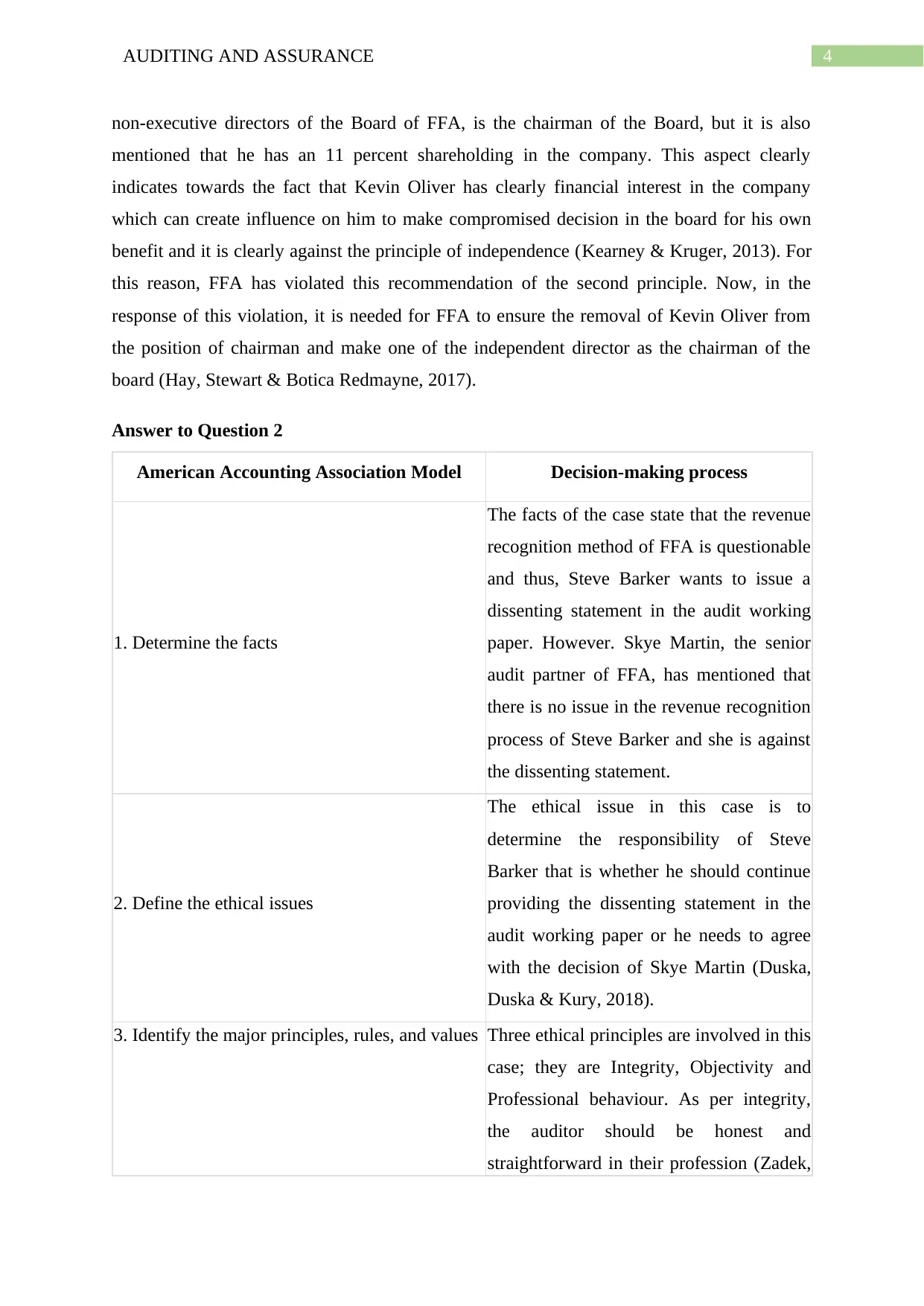
4AUDITING AND ASSURANCE
non-executive directors of the Board of FFA, is the chairman of the Board, but it is also
mentioned that he has an 11 percent shareholding in the company. This aspect clearly
indicates towards the fact that Kevin Oliver has clearly financial interest in the company
which can create influence on him to make compromised decision in the board for his own
benefit and it is clearly against the principle of independence (Kearney & Kruger, 2013). For
this reason, FFA has violated this recommendation of the second principle. Now, in the
response of this violation, it is needed for FFA to ensure the removal of Kevin Oliver from
the position of chairman and make one of the independent director as the chairman of the
board (Hay, Stewart & Botica Redmayne, 2017).
Answer to Question 2
American Accounting Association Model Decision-making process
1. Determine the facts
The facts of the case state that the revenue
recognition method of FFA is questionable
and thus, Steve Barker wants to issue a
dissenting statement in the audit working
paper. However. Skye Martin, the senior
audit partner of FFA, has mentioned that
there is no issue in the revenue recognition
process of Steve Barker and she is against
the dissenting statement.
2. Define the ethical issues
The ethical issue in this case is to
determine the responsibility of Steve
Barker that is whether he should continue
providing the dissenting statement in the
audit working paper or he needs to agree
with the decision of Skye Martin (Duska,
Duska & Kury, 2018).
3. Identify the major principles, rules, and values Three ethical principles are involved in this
case; they are Integrity, Objectivity and
Professional behaviour. As per integrity,
the auditor should be honest and
straightforward in their profession (Zadek,
non-executive directors of the Board of FFA, is the chairman of the Board, but it is also
mentioned that he has an 11 percent shareholding in the company. This aspect clearly
indicates towards the fact that Kevin Oliver has clearly financial interest in the company
which can create influence on him to make compromised decision in the board for his own
benefit and it is clearly against the principle of independence (Kearney & Kruger, 2013). For
this reason, FFA has violated this recommendation of the second principle. Now, in the
response of this violation, it is needed for FFA to ensure the removal of Kevin Oliver from
the position of chairman and make one of the independent director as the chairman of the
board (Hay, Stewart & Botica Redmayne, 2017).
Answer to Question 2
American Accounting Association Model Decision-making process
1. Determine the facts
The facts of the case state that the revenue
recognition method of FFA is questionable
and thus, Steve Barker wants to issue a
dissenting statement in the audit working
paper. However. Skye Martin, the senior
audit partner of FFA, has mentioned that
there is no issue in the revenue recognition
process of Steve Barker and she is against
the dissenting statement.
2. Define the ethical issues
The ethical issue in this case is to
determine the responsibility of Steve
Barker that is whether he should continue
providing the dissenting statement in the
audit working paper or he needs to agree
with the decision of Skye Martin (Duska,
Duska & Kury, 2018).
3. Identify the major principles, rules, and values Three ethical principles are involved in this
case; they are Integrity, Objectivity and
Professional behaviour. As per integrity,
the auditor should be honest and
straightforward in their profession (Zadek,
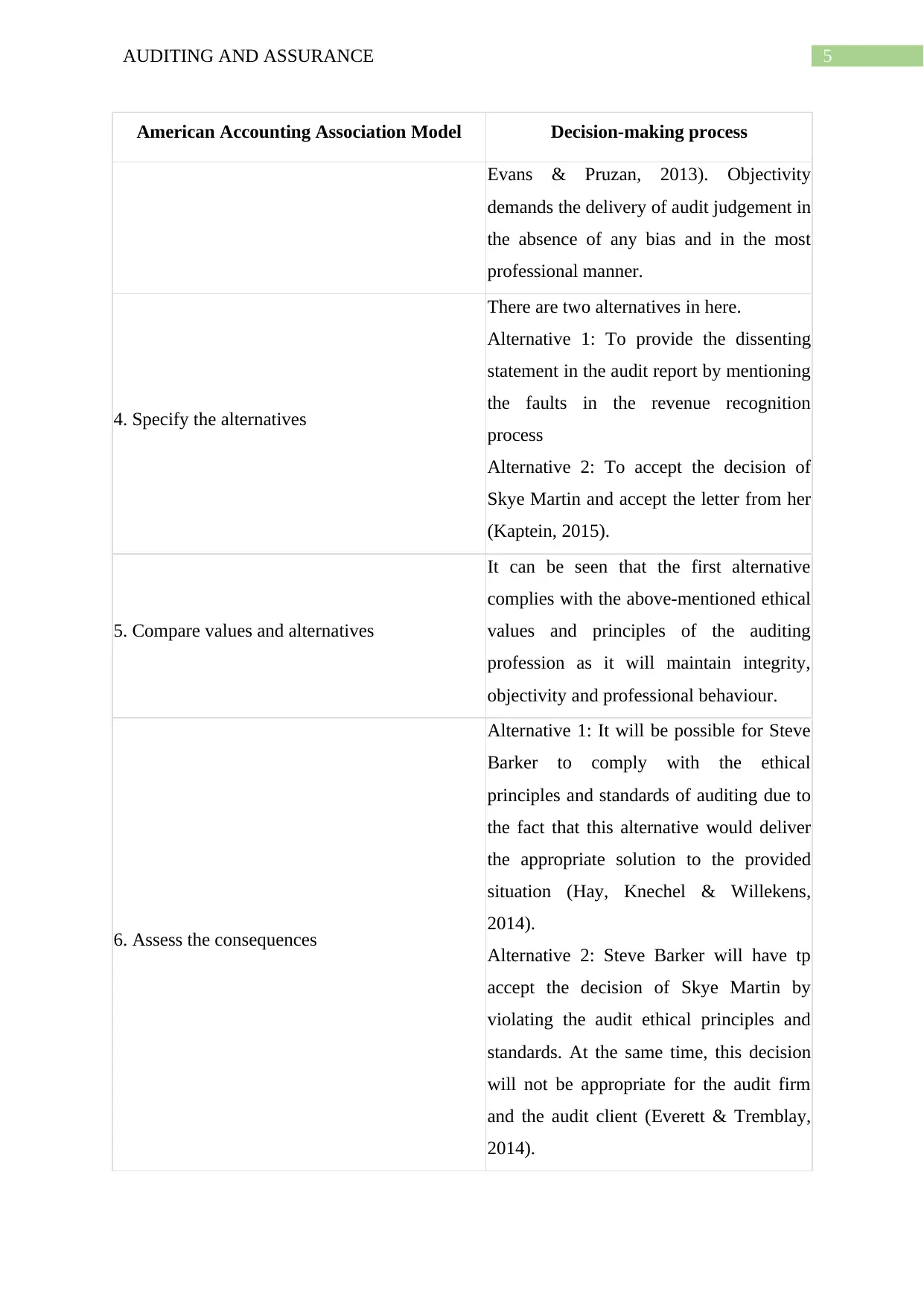
5AUDITING AND ASSURANCE
American Accounting Association Model Decision-making process
Evans & Pruzan, 2013). Objectivity
demands the delivery of audit judgement in
the absence of any bias and in the most
professional manner.
4. Specify the alternatives
There are two alternatives in here.
Alternative 1: To provide the dissenting
statement in the audit report by mentioning
the faults in the revenue recognition
process
Alternative 2: To accept the decision of
Skye Martin and accept the letter from her
(Kaptein, 2015).
5. Compare values and alternatives
It can be seen that the first alternative
complies with the above-mentioned ethical
values and principles of the auditing
profession as it will maintain integrity,
objectivity and professional behaviour.
6. Assess the consequences
Alternative 1: It will be possible for Steve
Barker to comply with the ethical
principles and standards of auditing due to
the fact that this alternative would deliver
the appropriate solution to the provided
situation (Hay, Knechel & Willekens,
2014).
Alternative 2: Steve Barker will have tp
accept the decision of Skye Martin by
violating the audit ethical principles and
standards. At the same time, this decision
will not be appropriate for the audit firm
and the audit client (Everett & Tremblay,
2014).
American Accounting Association Model Decision-making process
Evans & Pruzan, 2013). Objectivity
demands the delivery of audit judgement in
the absence of any bias and in the most
professional manner.
4. Specify the alternatives
There are two alternatives in here.
Alternative 1: To provide the dissenting
statement in the audit report by mentioning
the faults in the revenue recognition
process
Alternative 2: To accept the decision of
Skye Martin and accept the letter from her
(Kaptein, 2015).
5. Compare values and alternatives
It can be seen that the first alternative
complies with the above-mentioned ethical
values and principles of the auditing
profession as it will maintain integrity,
objectivity and professional behaviour.
6. Assess the consequences
Alternative 1: It will be possible for Steve
Barker to comply with the ethical
principles and standards of auditing due to
the fact that this alternative would deliver
the appropriate solution to the provided
situation (Hay, Knechel & Willekens,
2014).
Alternative 2: Steve Barker will have tp
accept the decision of Skye Martin by
violating the audit ethical principles and
standards. At the same time, this decision
will not be appropriate for the audit firm
and the audit client (Everett & Tremblay,
2014).
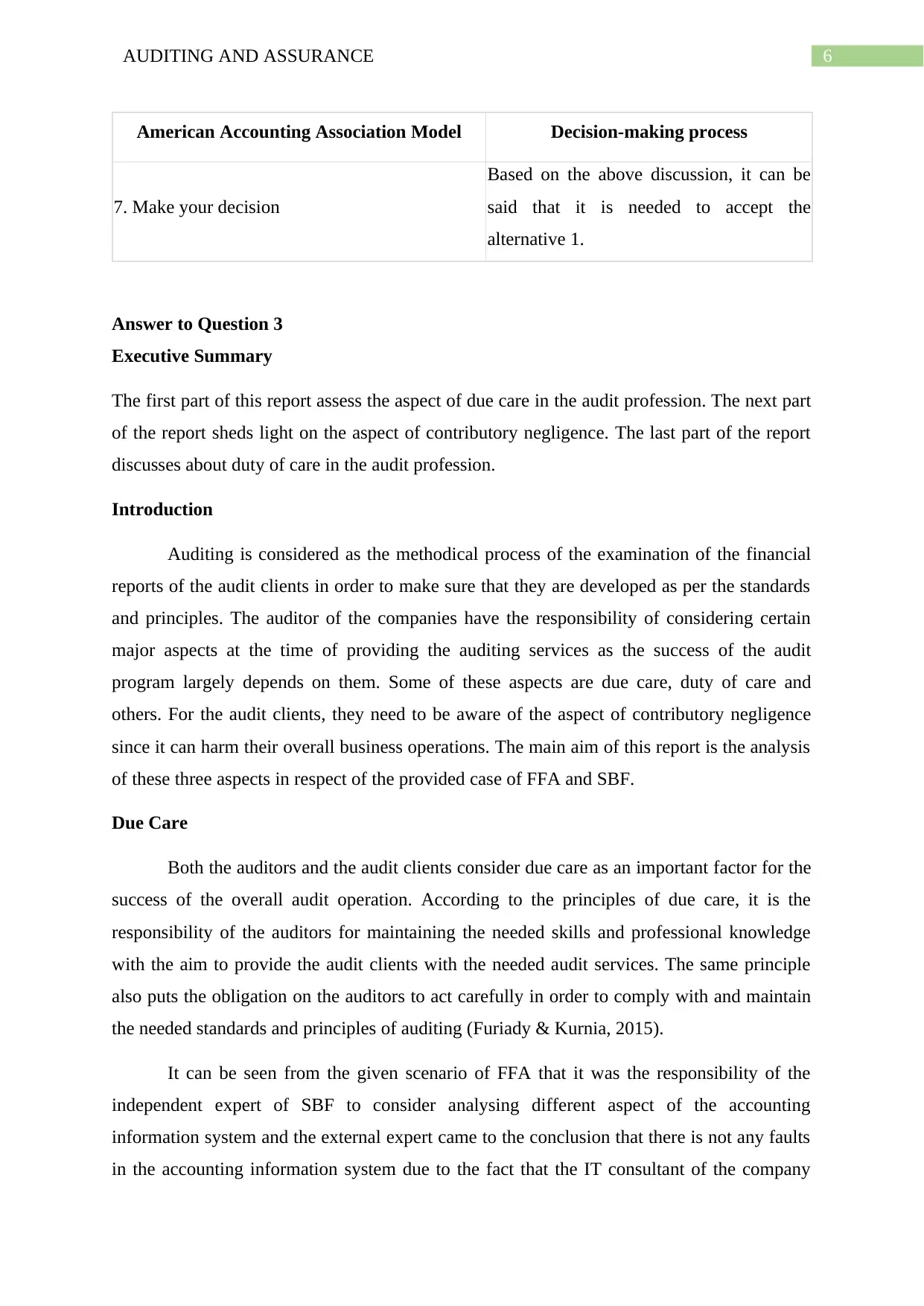
6AUDITING AND ASSURANCE
American Accounting Association Model Decision-making process
7. Make your decision
Based on the above discussion, it can be
said that it is needed to accept the
alternative 1.
Answer to Question 3
Executive Summary
The first part of this report assess the aspect of due care in the audit profession. The next part
of the report sheds light on the aspect of contributory negligence. The last part of the report
discusses about duty of care in the audit profession.
Introduction
Auditing is considered as the methodical process of the examination of the financial
reports of the audit clients in order to make sure that they are developed as per the standards
and principles. The auditor of the companies have the responsibility of considering certain
major aspects at the time of providing the auditing services as the success of the audit
program largely depends on them. Some of these aspects are due care, duty of care and
others. For the audit clients, they need to be aware of the aspect of contributory negligence
since it can harm their overall business operations. The main aim of this report is the analysis
of these three aspects in respect of the provided case of FFA and SBF.
Due Care
Both the auditors and the audit clients consider due care as an important factor for the
success of the overall audit operation. According to the principles of due care, it is the
responsibility of the auditors for maintaining the needed skills and professional knowledge
with the aim to provide the audit clients with the needed audit services. The same principle
also puts the obligation on the auditors to act carefully in order to comply with and maintain
the needed standards and principles of auditing (Furiady & Kurnia, 2015).
It can be seen from the given scenario of FFA that it was the responsibility of the
independent expert of SBF to consider analysing different aspect of the accounting
information system and the external expert came to the conclusion that there is not any faults
in the accounting information system due to the fact that the IT consultant of the company
American Accounting Association Model Decision-making process
7. Make your decision
Based on the above discussion, it can be
said that it is needed to accept the
alternative 1.
Answer to Question 3
Executive Summary
The first part of this report assess the aspect of due care in the audit profession. The next part
of the report sheds light on the aspect of contributory negligence. The last part of the report
discusses about duty of care in the audit profession.
Introduction
Auditing is considered as the methodical process of the examination of the financial
reports of the audit clients in order to make sure that they are developed as per the standards
and principles. The auditor of the companies have the responsibility of considering certain
major aspects at the time of providing the auditing services as the success of the audit
program largely depends on them. Some of these aspects are due care, duty of care and
others. For the audit clients, they need to be aware of the aspect of contributory negligence
since it can harm their overall business operations. The main aim of this report is the analysis
of these three aspects in respect of the provided case of FFA and SBF.
Due Care
Both the auditors and the audit clients consider due care as an important factor for the
success of the overall audit operation. According to the principles of due care, it is the
responsibility of the auditors for maintaining the needed skills and professional knowledge
with the aim to provide the audit clients with the needed audit services. The same principle
also puts the obligation on the auditors to act carefully in order to comply with and maintain
the needed standards and principles of auditing (Furiady & Kurnia, 2015).
It can be seen from the given scenario of FFA that it was the responsibility of the
independent expert of SBF to consider analysing different aspect of the accounting
information system and the external expert came to the conclusion that there is not any faults
in the accounting information system due to the fact that the IT consultant of the company
Paraphrase This Document
Need a fresh take? Get an instant paraphrase of this document with our AI Paraphraser
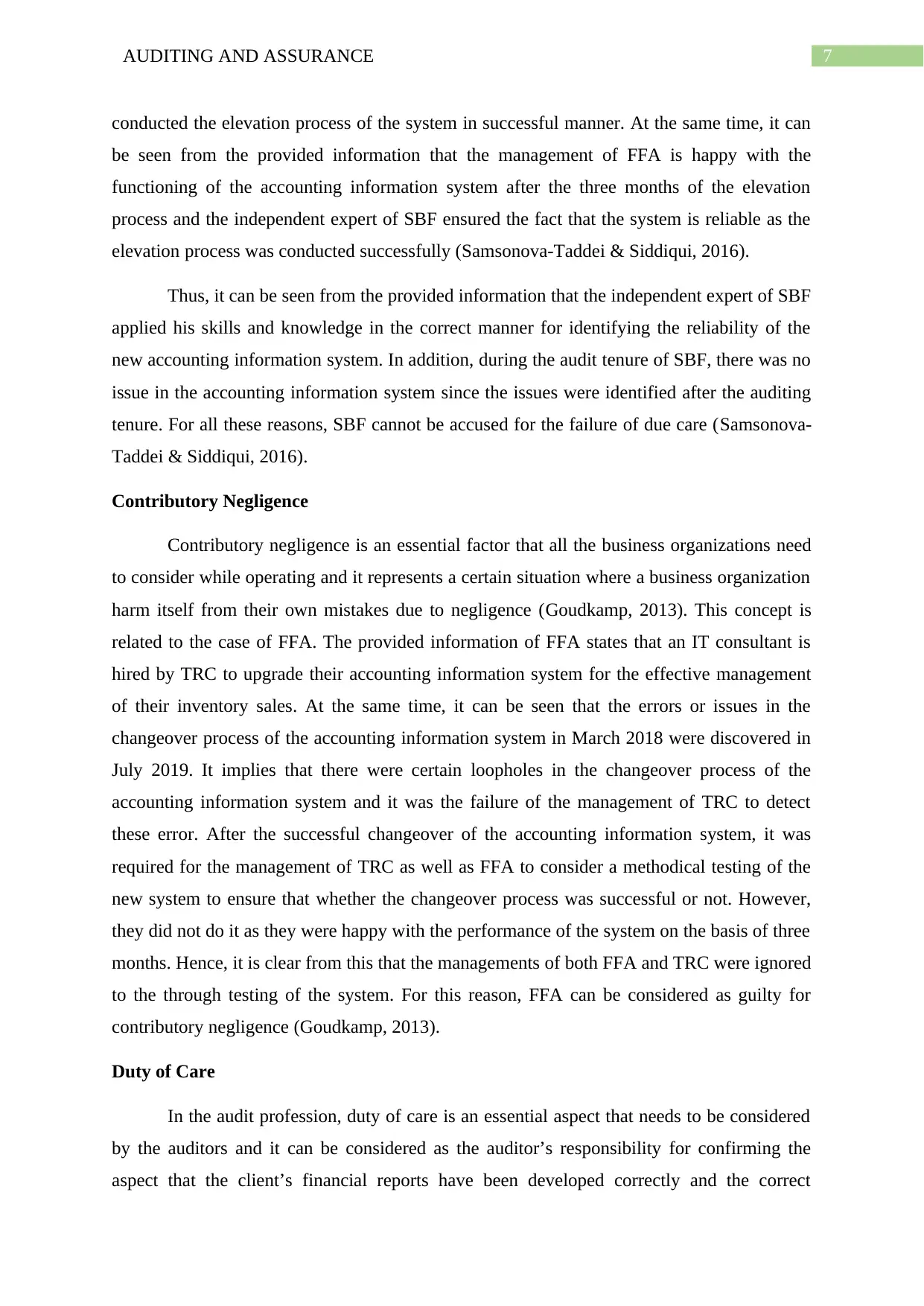
7AUDITING AND ASSURANCE
conducted the elevation process of the system in successful manner. At the same time, it can
be seen from the provided information that the management of FFA is happy with the
functioning of the accounting information system after the three months of the elevation
process and the independent expert of SBF ensured the fact that the system is reliable as the
elevation process was conducted successfully (Samsonova-Taddei & Siddiqui, 2016).
Thus, it can be seen from the provided information that the independent expert of SBF
applied his skills and knowledge in the correct manner for identifying the reliability of the
new accounting information system. In addition, during the audit tenure of SBF, there was no
issue in the accounting information system since the issues were identified after the auditing
tenure. For all these reasons, SBF cannot be accused for the failure of due care (Samsonova-
Taddei & Siddiqui, 2016).
Contributory Negligence
Contributory negligence is an essential factor that all the business organizations need
to consider while operating and it represents a certain situation where a business organization
harm itself from their own mistakes due to negligence (Goudkamp, 2013). This concept is
related to the case of FFA. The provided information of FFA states that an IT consultant is
hired by TRC to upgrade their accounting information system for the effective management
of their inventory sales. At the same time, it can be seen that the errors or issues in the
changeover process of the accounting information system in March 2018 were discovered in
July 2019. It implies that there were certain loopholes in the changeover process of the
accounting information system and it was the failure of the management of TRC to detect
these error. After the successful changeover of the accounting information system, it was
required for the management of TRC as well as FFA to consider a methodical testing of the
new system to ensure that whether the changeover process was successful or not. However,
they did not do it as they were happy with the performance of the system on the basis of three
months. Hence, it is clear from this that the managements of both FFA and TRC were ignored
to the through testing of the system. For this reason, FFA can be considered as guilty for
contributory negligence (Goudkamp, 2013).
Duty of Care
In the audit profession, duty of care is an essential aspect that needs to be considered
by the auditors and it can be considered as the auditor’s responsibility for confirming the
aspect that the client’s financial reports have been developed correctly and the correct
conducted the elevation process of the system in successful manner. At the same time, it can
be seen from the provided information that the management of FFA is happy with the
functioning of the accounting information system after the three months of the elevation
process and the independent expert of SBF ensured the fact that the system is reliable as the
elevation process was conducted successfully (Samsonova-Taddei & Siddiqui, 2016).
Thus, it can be seen from the provided information that the independent expert of SBF
applied his skills and knowledge in the correct manner for identifying the reliability of the
new accounting information system. In addition, during the audit tenure of SBF, there was no
issue in the accounting information system since the issues were identified after the auditing
tenure. For all these reasons, SBF cannot be accused for the failure of due care (Samsonova-
Taddei & Siddiqui, 2016).
Contributory Negligence
Contributory negligence is an essential factor that all the business organizations need
to consider while operating and it represents a certain situation where a business organization
harm itself from their own mistakes due to negligence (Goudkamp, 2013). This concept is
related to the case of FFA. The provided information of FFA states that an IT consultant is
hired by TRC to upgrade their accounting information system for the effective management
of their inventory sales. At the same time, it can be seen that the errors or issues in the
changeover process of the accounting information system in March 2018 were discovered in
July 2019. It implies that there were certain loopholes in the changeover process of the
accounting information system and it was the failure of the management of TRC to detect
these error. After the successful changeover of the accounting information system, it was
required for the management of TRC as well as FFA to consider a methodical testing of the
new system to ensure that whether the changeover process was successful or not. However,
they did not do it as they were happy with the performance of the system on the basis of three
months. Hence, it is clear from this that the managements of both FFA and TRC were ignored
to the through testing of the system. For this reason, FFA can be considered as guilty for
contributory negligence (Goudkamp, 2013).
Duty of Care
In the audit profession, duty of care is an essential aspect that needs to be considered
by the auditors and it can be considered as the auditor’s responsibility for confirming the
aspect that the client’s financial reports have been developed correctly and the correct
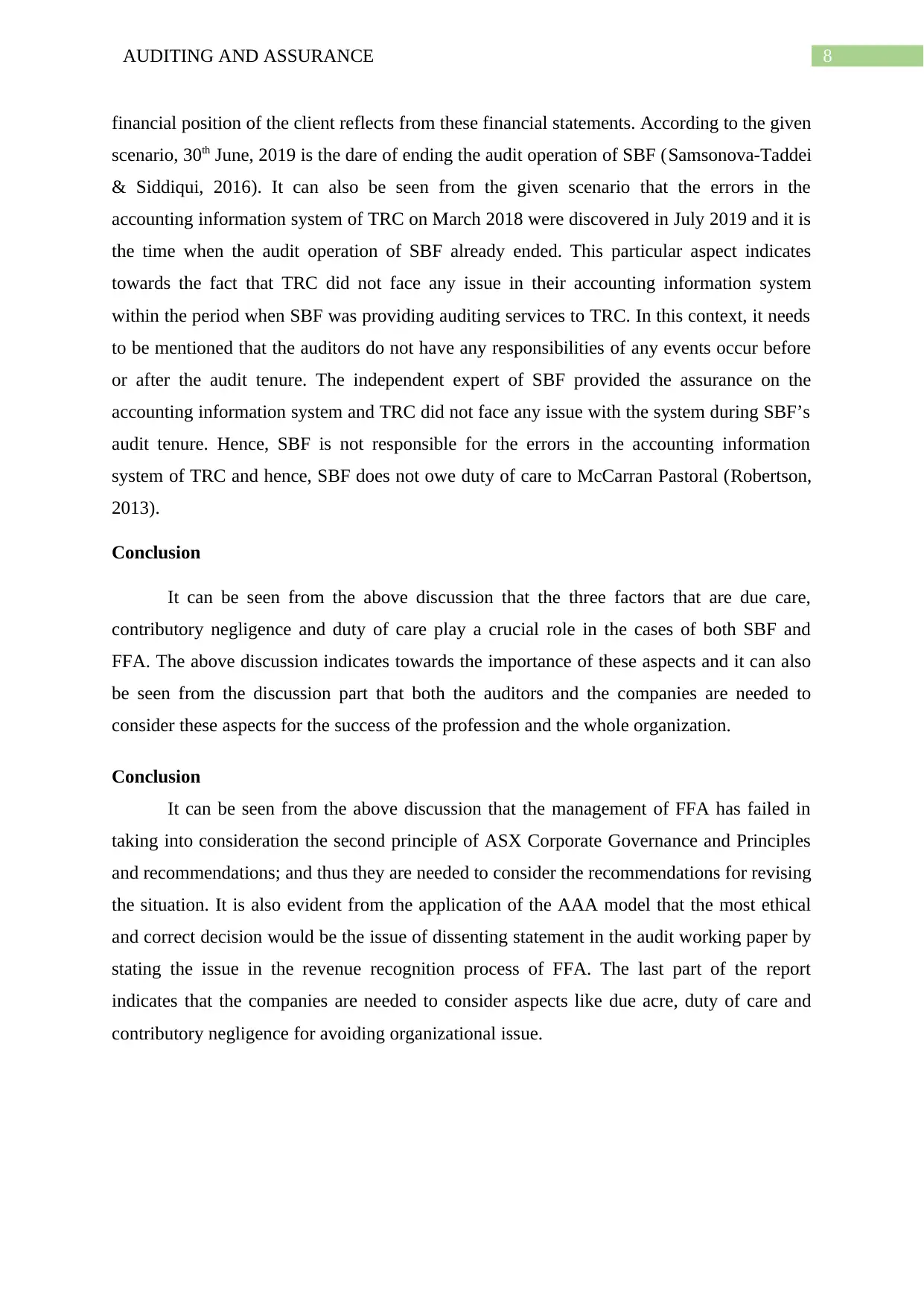
8AUDITING AND ASSURANCE
financial position of the client reflects from these financial statements. According to the given
scenario, 30th June, 2019 is the dare of ending the audit operation of SBF (Samsonova-Taddei
& Siddiqui, 2016). It can also be seen from the given scenario that the errors in the
accounting information system of TRC on March 2018 were discovered in July 2019 and it is
the time when the audit operation of SBF already ended. This particular aspect indicates
towards the fact that TRC did not face any issue in their accounting information system
within the period when SBF was providing auditing services to TRC. In this context, it needs
to be mentioned that the auditors do not have any responsibilities of any events occur before
or after the audit tenure. The independent expert of SBF provided the assurance on the
accounting information system and TRC did not face any issue with the system during SBF’s
audit tenure. Hence, SBF is not responsible for the errors in the accounting information
system of TRC and hence, SBF does not owe duty of care to McCarran Pastoral (Robertson,
2013).
Conclusion
It can be seen from the above discussion that the three factors that are due care,
contributory negligence and duty of care play a crucial role in the cases of both SBF and
FFA. The above discussion indicates towards the importance of these aspects and it can also
be seen from the discussion part that both the auditors and the companies are needed to
consider these aspects for the success of the profession and the whole organization.
Conclusion
It can be seen from the above discussion that the management of FFA has failed in
taking into consideration the second principle of ASX Corporate Governance and Principles
and recommendations; and thus they are needed to consider the recommendations for revising
the situation. It is also evident from the application of the AAA model that the most ethical
and correct decision would be the issue of dissenting statement in the audit working paper by
stating the issue in the revenue recognition process of FFA. The last part of the report
indicates that the companies are needed to consider aspects like due acre, duty of care and
contributory negligence for avoiding organizational issue.
financial position of the client reflects from these financial statements. According to the given
scenario, 30th June, 2019 is the dare of ending the audit operation of SBF (Samsonova-Taddei
& Siddiqui, 2016). It can also be seen from the given scenario that the errors in the
accounting information system of TRC on March 2018 were discovered in July 2019 and it is
the time when the audit operation of SBF already ended. This particular aspect indicates
towards the fact that TRC did not face any issue in their accounting information system
within the period when SBF was providing auditing services to TRC. In this context, it needs
to be mentioned that the auditors do not have any responsibilities of any events occur before
or after the audit tenure. The independent expert of SBF provided the assurance on the
accounting information system and TRC did not face any issue with the system during SBF’s
audit tenure. Hence, SBF is not responsible for the errors in the accounting information
system of TRC and hence, SBF does not owe duty of care to McCarran Pastoral (Robertson,
2013).
Conclusion
It can be seen from the above discussion that the three factors that are due care,
contributory negligence and duty of care play a crucial role in the cases of both SBF and
FFA. The above discussion indicates towards the importance of these aspects and it can also
be seen from the discussion part that both the auditors and the companies are needed to
consider these aspects for the success of the profession and the whole organization.
Conclusion
It can be seen from the above discussion that the management of FFA has failed in
taking into consideration the second principle of ASX Corporate Governance and Principles
and recommendations; and thus they are needed to consider the recommendations for revising
the situation. It is also evident from the application of the AAA model that the most ethical
and correct decision would be the issue of dissenting statement in the audit working paper by
stating the issue in the revenue recognition process of FFA. The last part of the report
indicates that the companies are needed to consider aspects like due acre, duty of care and
contributory negligence for avoiding organizational issue.
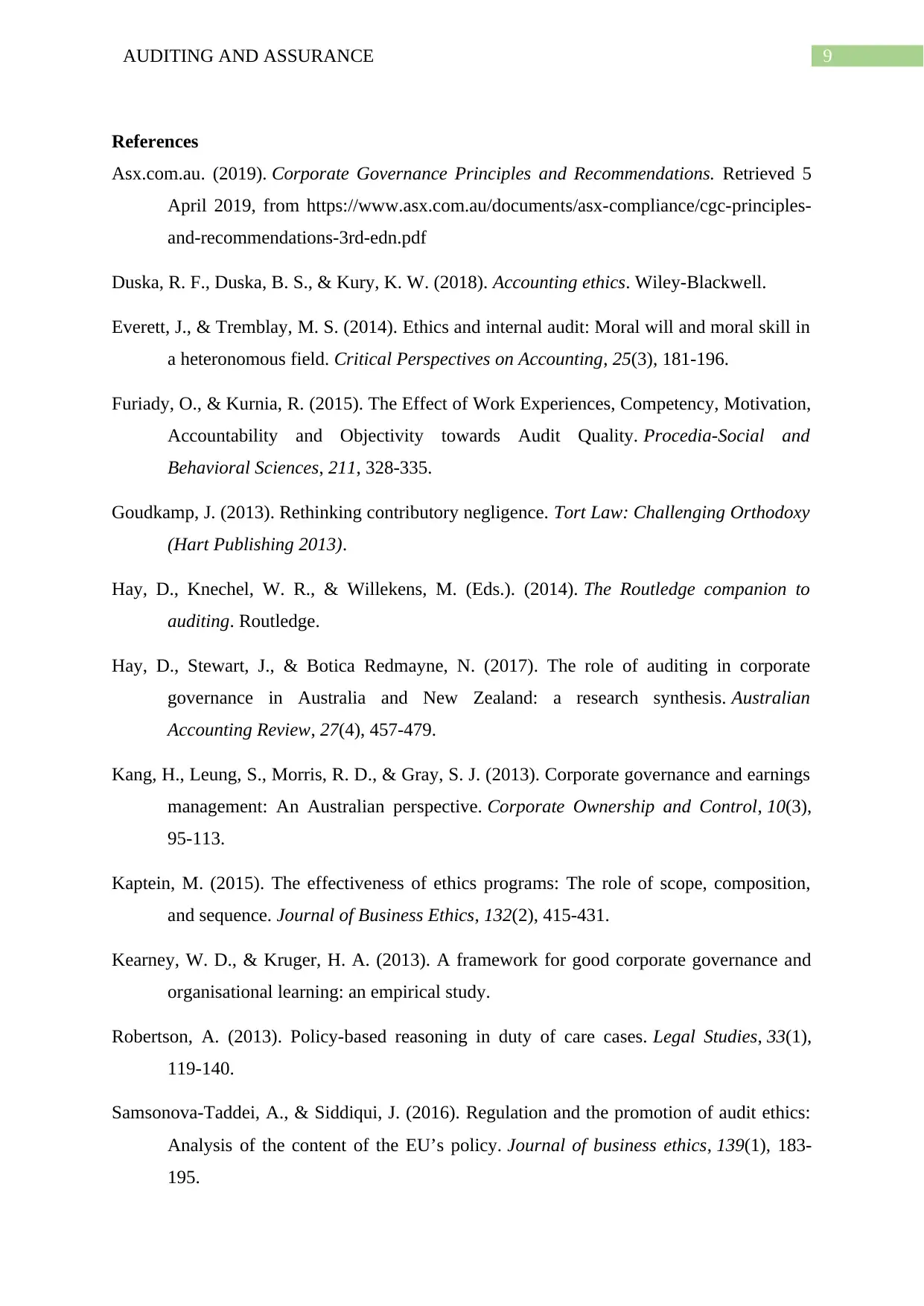
9AUDITING AND ASSURANCE
References
Asx.com.au. (2019). Corporate Governance Principles and Recommendations. Retrieved 5
April 2019, from https://www.asx.com.au/documents/asx-compliance/cgc-principles-
and-recommendations-3rd-edn.pdf
Duska, R. F., Duska, B. S., & Kury, K. W. (2018). Accounting ethics. Wiley-Blackwell.
Everett, J., & Tremblay, M. S. (2014). Ethics and internal audit: Moral will and moral skill in
a heteronomous field. Critical Perspectives on Accounting, 25(3), 181-196.
Furiady, O., & Kurnia, R. (2015). The Effect of Work Experiences, Competency, Motivation,
Accountability and Objectivity towards Audit Quality. Procedia-Social and
Behavioral Sciences, 211, 328-335.
Goudkamp, J. (2013). Rethinking contributory negligence. Tort Law: Challenging Orthodoxy
(Hart Publishing 2013).
Hay, D., Knechel, W. R., & Willekens, M. (Eds.). (2014). The Routledge companion to
auditing. Routledge.
Hay, D., Stewart, J., & Botica Redmayne, N. (2017). The role of auditing in corporate
governance in Australia and New Zealand: a research synthesis. Australian
Accounting Review, 27(4), 457-479.
Kang, H., Leung, S., Morris, R. D., & Gray, S. J. (2013). Corporate governance and earnings
management: An Australian perspective. Corporate Ownership and Control, 10(3),
95-113.
Kaptein, M. (2015). The effectiveness of ethics programs: The role of scope, composition,
and sequence. Journal of Business Ethics, 132(2), 415-431.
Kearney, W. D., & Kruger, H. A. (2013). A framework for good corporate governance and
organisational learning: an empirical study.
Robertson, A. (2013). Policy-based reasoning in duty of care cases. Legal Studies, 33(1),
119-140.
Samsonova-Taddei, A., & Siddiqui, J. (2016). Regulation and the promotion of audit ethics:
Analysis of the content of the EU’s policy. Journal of business ethics, 139(1), 183-
195.
References
Asx.com.au. (2019). Corporate Governance Principles and Recommendations. Retrieved 5
April 2019, from https://www.asx.com.au/documents/asx-compliance/cgc-principles-
and-recommendations-3rd-edn.pdf
Duska, R. F., Duska, B. S., & Kury, K. W. (2018). Accounting ethics. Wiley-Blackwell.
Everett, J., & Tremblay, M. S. (2014). Ethics and internal audit: Moral will and moral skill in
a heteronomous field. Critical Perspectives on Accounting, 25(3), 181-196.
Furiady, O., & Kurnia, R. (2015). The Effect of Work Experiences, Competency, Motivation,
Accountability and Objectivity towards Audit Quality. Procedia-Social and
Behavioral Sciences, 211, 328-335.
Goudkamp, J. (2013). Rethinking contributory negligence. Tort Law: Challenging Orthodoxy
(Hart Publishing 2013).
Hay, D., Knechel, W. R., & Willekens, M. (Eds.). (2014). The Routledge companion to
auditing. Routledge.
Hay, D., Stewart, J., & Botica Redmayne, N. (2017). The role of auditing in corporate
governance in Australia and New Zealand: a research synthesis. Australian
Accounting Review, 27(4), 457-479.
Kang, H., Leung, S., Morris, R. D., & Gray, S. J. (2013). Corporate governance and earnings
management: An Australian perspective. Corporate Ownership and Control, 10(3),
95-113.
Kaptein, M. (2015). The effectiveness of ethics programs: The role of scope, composition,
and sequence. Journal of Business Ethics, 132(2), 415-431.
Kearney, W. D., & Kruger, H. A. (2013). A framework for good corporate governance and
organisational learning: an empirical study.
Robertson, A. (2013). Policy-based reasoning in duty of care cases. Legal Studies, 33(1),
119-140.
Samsonova-Taddei, A., & Siddiqui, J. (2016). Regulation and the promotion of audit ethics:
Analysis of the content of the EU’s policy. Journal of business ethics, 139(1), 183-
195.
Secure Best Marks with AI Grader
Need help grading? Try our AI Grader for instant feedback on your assignments.
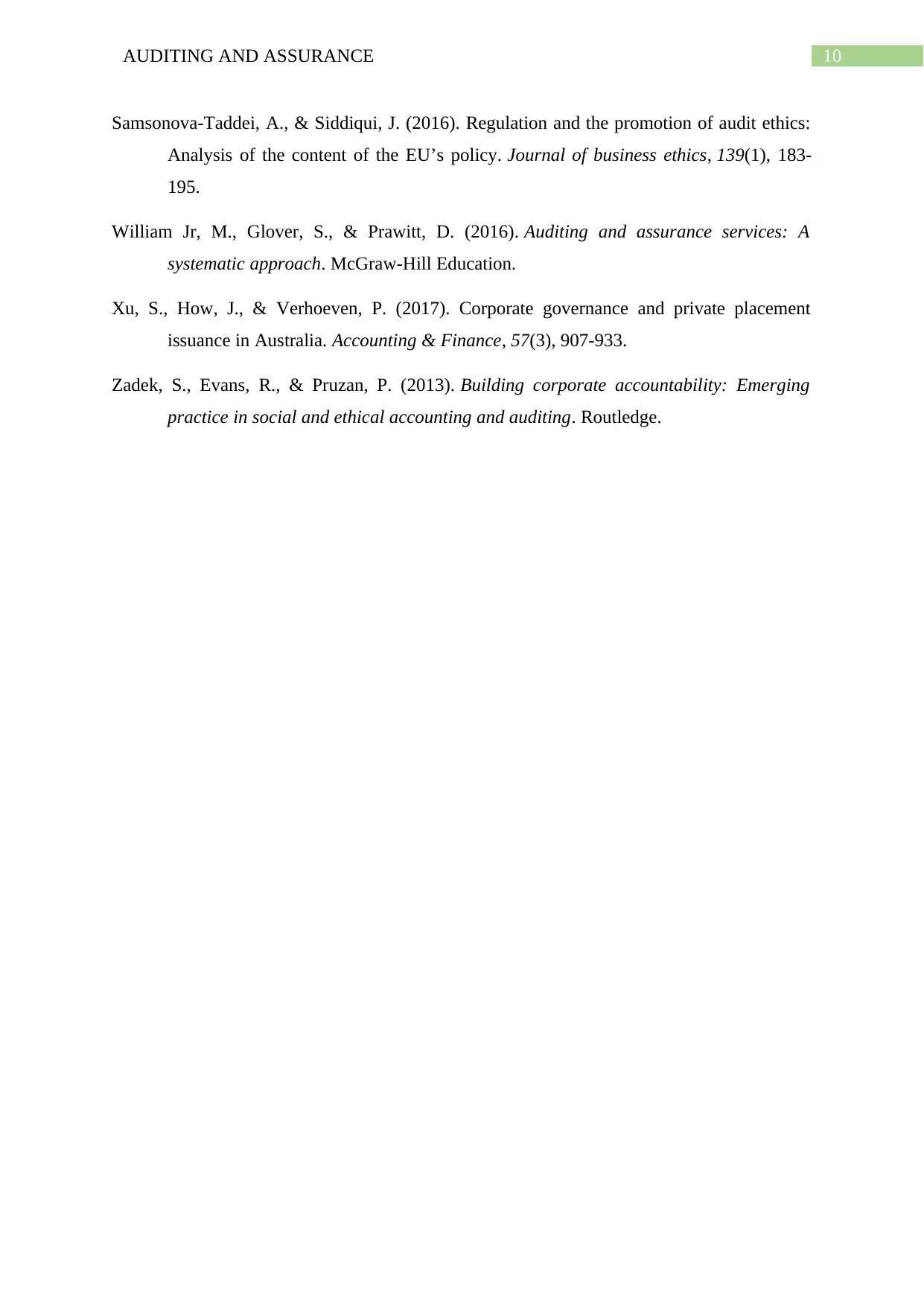
10AUDITING AND ASSURANCE
Samsonova-Taddei, A., & Siddiqui, J. (2016). Regulation and the promotion of audit ethics:
Analysis of the content of the EU’s policy. Journal of business ethics, 139(1), 183-
195.
William Jr, M., Glover, S., & Prawitt, D. (2016). Auditing and assurance services: A
systematic approach. McGraw-Hill Education.
Xu, S., How, J., & Verhoeven, P. (2017). Corporate governance and private placement
issuance in Australia. Accounting & Finance, 57(3), 907-933.
Zadek, S., Evans, R., & Pruzan, P. (2013). Building corporate accountability: Emerging
practice in social and ethical accounting and auditing. Routledge.
Samsonova-Taddei, A., & Siddiqui, J. (2016). Regulation and the promotion of audit ethics:
Analysis of the content of the EU’s policy. Journal of business ethics, 139(1), 183-
195.
William Jr, M., Glover, S., & Prawitt, D. (2016). Auditing and assurance services: A
systematic approach. McGraw-Hill Education.
Xu, S., How, J., & Verhoeven, P. (2017). Corporate governance and private placement
issuance in Australia. Accounting & Finance, 57(3), 907-933.
Zadek, S., Evans, R., & Pruzan, P. (2013). Building corporate accountability: Emerging
practice in social and ethical accounting and auditing. Routledge.
1 out of 11
Related Documents
Your All-in-One AI-Powered Toolkit for Academic Success.
+13062052269
info@desklib.com
Available 24*7 on WhatsApp / Email
![[object Object]](/_next/static/media/star-bottom.7253800d.svg)
Unlock your academic potential
© 2024 | Zucol Services PVT LTD | All rights reserved.





